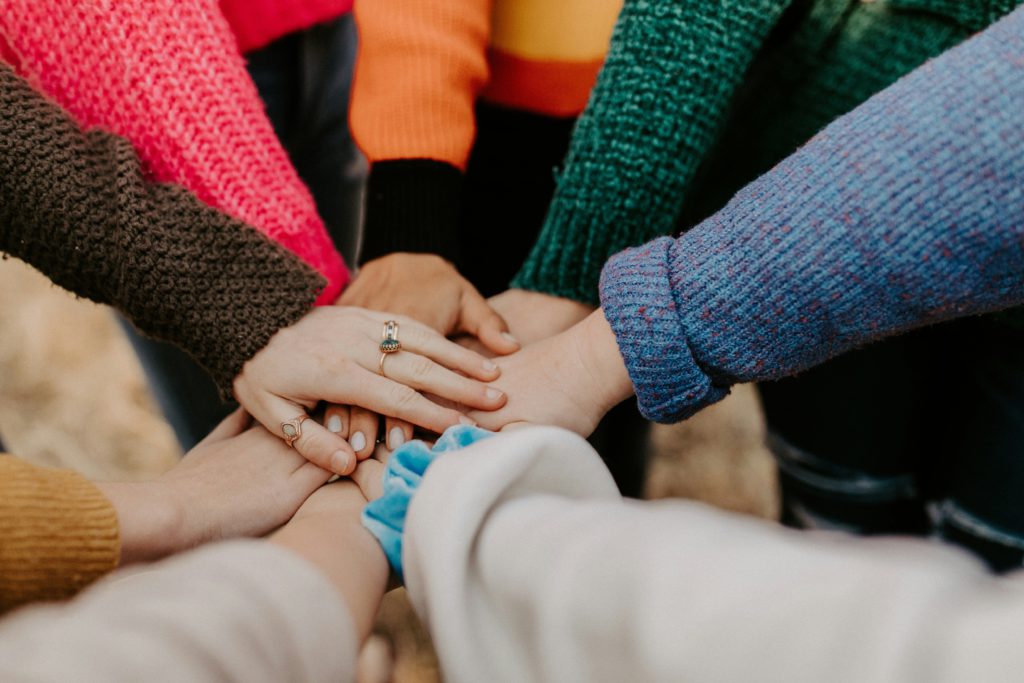The Importance of Community in Food Addiction Recovery
The Importance of Community in Food Addiction Recovery
Categories: AACC BLOG
by Rhona Epstein, Ph.D.

As counselors, we all know the invaluable benefits of therapy in treating any kind of addiction. Having a designated place and confidant to talk through the underlying issues that inform the addictive process is crucial for breakthrough and understanding.
But, in my experience—both personally and professionally—counseling isn’t enough to fully shift a life out of food addiction and into peace. It is, of course, a huge and necessary part of the process. But over the course of my career, I have found that lasting transformation takes place in the community.
When I began my own recovery process in my late teens, I had no idea that compulsive eating, bulimia, and food addiction were problems other people struggled with and understood—let alone thousands of people across the world. Had it not been for the people I met in the initial recovery meetings I attended, I never would have learned that reality.
The people I met in recovery helped save my life in many ways, but the most important one was that they showed me that I wasn’t alone. Listening to their experiences helped me name my own.
When I relapsed, there were people who had been there before me to encourage me that it was part of the process. When I felt depression creeping in, they pulled me up out of the darkness and into the light. They chased me down when I was too scared to commit to recovery, and I listened to them because I had heard their stories and knew they truly understood why I was afraid.
Seeing that recovery was possible for them made me believe it was possible for me.
Over the years, I’ve encouraged most of my clients to join a community to start and sustain their recovery. Some clients, however, prefer to rely solely on counseling. While they often make initial progress, I’ve noticed that counseling alone doesn’t provide the mindset or spiritual transformation needed for lasting recovery. Old habits tend to resurface without ongoing support, and lack of accountability leads to “amnesia”.
In contrast, I’ve rarely seen a client whose life or healing process wasn’t vastly improved by joining a 12-step program or support group. Meeting weekly—or more often—strengthens one’s resolve to stay the course. People learn from each other, lean on each other, fail together, and grow together. As Galatians 6:2 says, “We bear one another’s burdens.”
The Bible also reminds us time and again that we weren’t made to walk through life alone—especially trials and hardships. Proverbs 27:17 says, “As iron sharpens iron, so one person sharpens another.” Similarly, Ecclesiastes 4:9-10 says, “Two are better than one because they have a good return for their labor: If either of them falls down, one can help the other up. But pity anyone who falls and has no one to help them.”
We weren’t created to do life alone. We need each other!
We especially need people in our lives who are further ahead on their recovery paths and able to help guide us on our own. In fact, research supports the benefits of peer support for addiction recovery. There is evidence of increased abstinence from addictive behavior, reduced relapse, and increased self-efficacy.1
I recently launched my own support group for food addiction, the Satisfied Online Course. In this community, we meet online every week to share our experiences with each other. In setting aside a designated safe space to talk with and listen to one another, an inherent sense of accountability and vulnerability develops—which helps fortify us on the ambling and unpredictable journey of recovery. We bear witness to one another’s lives, which allows us to specifically and meaningfully encourage one another.
If someone in the group slips up during the week, there are 8 people on speed dial they can call for support. We pray for each other and lovingly call each other out when needed. We get to remind one another on a regular basis that we are not alone. While everyone’s journey is their own, there are many others who have walked the same road. Even after the course ends, each member knows they have someone to turn to in times of need.
Pursuing recovery within a loving community increases the chances of maintaining freedom exponentially. As counselors, we serve our clients best when we remind them of this timeless truth. Our work with them is only a part of their journey; it’s equally important that they find safe spaces outside our offices to move forward.
_________________________________________________________________________________________
Rhona Epstein, Psy.D., is a licensed psychologist, addictions counselor, and marriage and family therapist in the Philadelphia area and the author of multiple books, including Food Triggers and Satisfied. For more than thirty years, she’s led seminars, conferences, and therapeutic workshops to help people overcome food addiction and its underlying issues. Dr. Rhona received her doctorate in clinical psychology from Chestnut Hill College and her master’s degree in counseling psychology from Temple University. Fueled by her own experience and recovery from food addiction, she is passionate about addressing the needs of the whole person (mind, body, and spirit). Dr. Rhona lives in the Philadelphia, PA, area.
_________________________________________________________________________________________
1 Tracy, K., & Wallace, S. P. (2016). Benefits of peer support groups in the treatment of addiction. Substance abuse and rehabilitation, 7, 143–154. https://doi.org/10.2147/SAR.S81535
